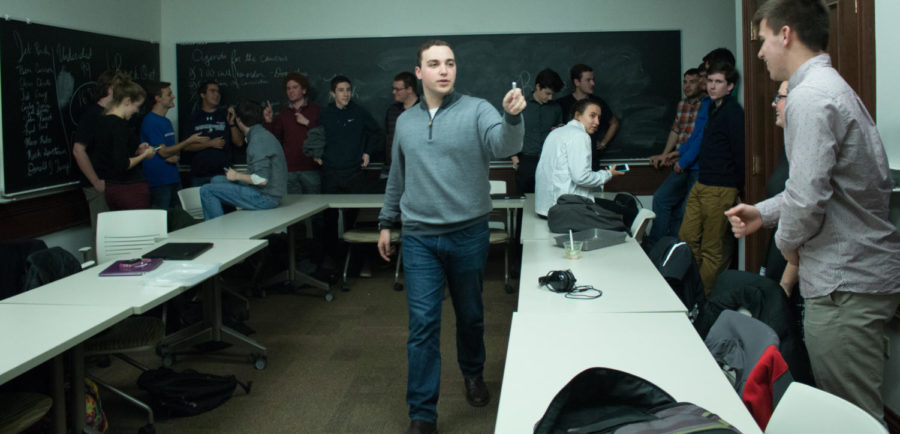University of Chicago students marked the long-anticipated Iowa caucus on-campus and off yesterday. Both the University of Chicago Democrats (UC Dems) and the College Republicans hosted mock caucuses, and the Institute of Politics (IOP) sent a group of students to Iowa to observe the caucuses in person.
Hillary Clinton came out ahead at the mock Iowa caucus hosted by the UC Dems yesterday night. The mock caucus centered around three issues: the candidates’ electability, their positions on foreign policy, and their personal characters.
The event functioned according to the rules of the actual Iowa caucus—delegates presented initial arguments, sorted themselves by candidate, and debated further.
The 15 students who were in attendance initially split the vote with nine for Clinton, four for Bernie Sanders, and two for Martin O’Malley. Afterward, because O’Malley’s delegates did not reach 15 percent of the vote, they were required to choose another candidate. Arguments for Clinton’s superior foreign policy experience and electability swayed the O’Malley delegation to join the Clinton camp.
The delegates agreed on the importance of the Iowa caucus and its ability to elicit debate. “It’s the essence of participatory democracy. You go out with members of your town and demonstrate your political values to people you buy your groceries from, your neighbors, and you have the chance to talk about political opinions with your entire community,” UC Dems president Henry Bensinger said.
Some participants hoped that the Iowa caucus would give more attention to less mainstream candidates. “In terms of what is deemed politically possible or impossible, those limits need to be consistently challenged—or else we won’t be able to accomplish any new policy,” UC Dems communication director Nico Aldape said.
The College Republicans also hosted a mock caucus. Second-year Max Freedman, the political liaison for College Republicans, served as the caucus chair. Freedman, who learned about Iowa politics through seminars and boot camps as an Institute of Politics Iowa Project Fellow, began the mock caucus by giving an overview of the structure of the Iowa caucus.
Though the Iowa Republican caucus procedure uses written ballots, the College Republicans chose to follow the Democratic procedure, in which participants congregate in designated areas in the room to vote for their favored candidates.
Members then volunteered to give brief statements of support for each Republican candidate. After the statements, participants assembled to vote.
In keeping with the regulations of the Iowa Democratic caucus, only candidates who obtained more than 15 percent of votes received delegates. After the first round of voting, participants supporting candidates who did not meet this minimum were able to switch to another candidate.
Marco Rubio came in first place in the mock caucus, with 12 delegates, followed by Jim Gilmore, with 11 delegates. Every other candidate was disqualified after receiving less than 15 percent of the vote. Gilmore, who is polling at less than 1 percent in Iowa, gained substantial support from participants whose first-choice candidates did not meet the 15 percent cutoff.
“Who was the last person to unite the Grand Old Party? Reagan. Who’s the next person to unite the Grand Old Party? Rubio,” second-year Ernesto Ambrocio said in his statement in support of Rubio.
“Jim Gilmore stands for a strong fight against terrorism, a Washington that does not intrude on our lives, and a U.S. federal government that protects the people and encourages economic growth for the middle class,” second-year James Miller said while speaking in favor of Gilmore.
From January 31 to February 2, the IOP sent students to Des Moines to attend the Iowa caucus. These students went to a rally for candidate Martin O’Malley, saw the taping of ABC News’s coverage of the caucus, and met Bill Clinton, Heidi Cruz, Iowa Governor Terry Branstad, and Polk County Auditor Jamie Fitzgerald. As part of the excursion, members of The Gate, the student-run political magazine, interviewed Heidi Cruz, the wife of the Republican front-runner Ted Cruz.









